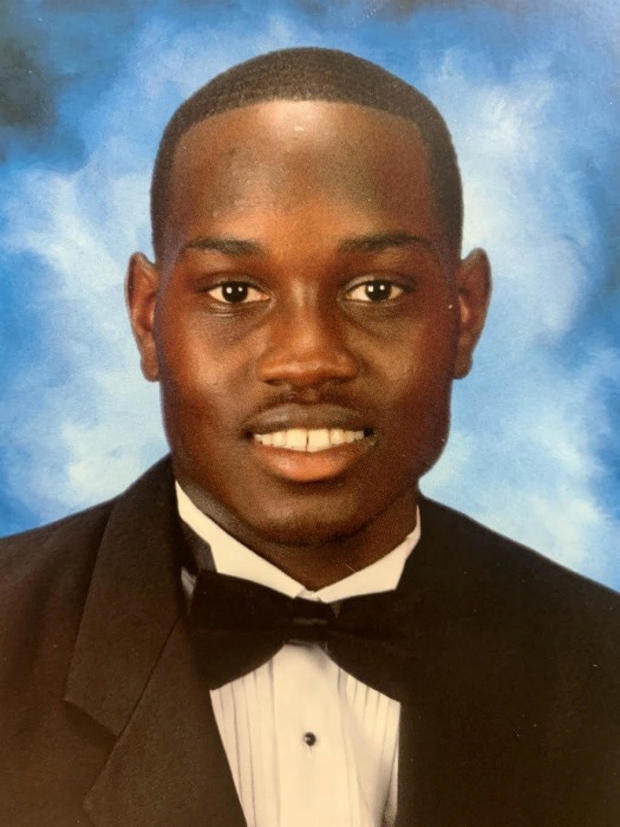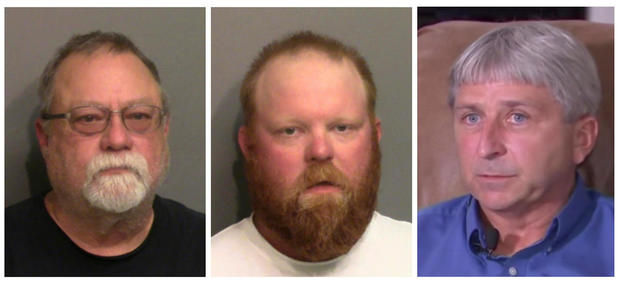Jury continues deliberations in trial for Ahmaud Arbery's killing
get the free appA jury is continuing deliberations Wednesday in the trial of three men charged with killing Ahmaud Arbery in Brunswick, Georgia.
Travis McMichael, his father Gregory McMichael and their neighbor William "Roddie" Bryan have all been charged with murder and other counts for the death of Arbery, a 25-year-old Black man who was jogging in the neighborhood in February 2020.
The court heard final rebuttal arguments from the prosecution Tuesday morning, after both the prosecution and the defense delivered their closing arguments on Monday.
The defense claims the men acted lawfully under the state's citizen's arrest law — which was in effect at the time but has since been repealed — because they were suspicious he might have been involved in neighborhood burglaries. And they say they had a right of self-defense against Arbery who, one defense attorney said Monday, "chose to fight."
The prosecution disputed all of that.
"All three of these defendants made assumptions — made assumptions about what was going on that day, and they made their decision to attack Ahmaud Arbery in their driveways because he was a Black man running down the street," lead prosecutor Linda Dunikoski told the jury.
Dunikoski had the opportunity to deliver a rebuttal Tuesday after the jury heard from attorneys for each of the three defendants Monday.
"It is absolutely horrific and tragic that this has happened. And again this is where the law is intertwined with heartache and tragedy. You are allowed to defend yourself. You are allowed to use force that is likely to cause death or serious bodily injury if you believe it is necessary," Jason Sheffield, a defense attorney for Travis McMichael, the man who fired the fatal shots, told the jury. "This is a law that is for a person in Travis' situation."
Laura D. Hogue, an attorney for Gregory McMichael, tried to refute the state's characterization of Arbery as a "victim" in this case, and pointed the jury to the choices he made that brought him to the Satilla Shores neighborhood. Hogue said Arbery "was not an innocent victim."
Meanwhile, Bryan's attorney, Kevin Gough, contended that without his client there would be no charges in the case because there would have been no video evidence. He also argued that Bryan showed no "malice" and that Arbery would have died whether Bryan was there or not, noting that the 25-year-old would not have been able to "outrun" Travis McMichael's bullets.
It took national outcry and the release of the video for charges to be brought in the case, two and a half months after Arbery was shot and killed.
Each of the three defendants is facing nine criminal counts including malice murder, felony murder, aggravated assault and false imprisonment.
Judge gives instructions to the jury
Superior Court Judge Timothy Walmsley delivered instructions to the jury explaining the applicable laws in the case. He noted that the jurors should consider each count against each defendant separately, and that they may reach different verdicts for the different defendants. Each verdict must be unanimous.
The jury was then sent to begin deliberations once they receive the evidence.
Prosecutor: Arbery was killed "for absolutely no good reason at all"
Wrapping up her rebuttal in just under two hours, prosecutor Linda Dunikoski made the state's final arguments as to why the jury should find all three men guilty.
"Bottom line, ladies and gentlemen, they committed four felonies against Ahmaud Arbery. He was trying to get away from these strangers that were yelling at him, threatening to kill him. And then they killed him," she said.
With the end of the case in sight, the prosecutor reminded the jury that in their decision, they represent their community of Glynn County. She added that as members of the jury, they are not answering whether the defendants "are good people or bad people," but rather they must determine whether they should be held "responsible" and "accountable" for their actions.
She added that Arbery was killed "for absolutely no good reason at all."
Prosecutor breaks down citizen's arrest law for jurors
After repeated disputes with the defense over the government's explanation to the jury of Georgia's citizen's arrest law, the state continued with its explanation. Prosecutor Linda Duniksoki said it could only be used for emergency situations and must be acted on immediately after witnessing a crime.
Whether the defendants were acting within the bounds of the citizen's arrest law is key to the case, since it would undermine their claim of self-defense if they had no legal grounds for stopping Arbery in the first place.
Though Arbery had stopped to look around a house under construction in the neighborhood, "nothing had ever been taken from the construction site," Dunikoski said.
She argued that Travis and Gregory McMichael's actions were not protected under the citizen's arrest law because they were "uncertain" about Arbery's activity that day.
"That is irrational," Dunikoski told the jurors.
During Monday's closing arguments, one defense attorney, Laura Hogue, painted Arbery as a felon rather than a victim, attempting to pin the blame on Arbery for his own death. Dunukoski called that tactic "offensive."
"No badge, no uniform, no authority," Dunikoski described the three defendants to the jury. "Just some strange guys in a white pickup truck."
She characterized Arbery as "a fellow citizen," "a human being," whom the McMichaels demanded to stop what he was doing and talk to them, before the defendants went right to deadly force.
She also replayed for the jury the recording of a 911 call Gregory McMichael made that day, pointing out that he did not actually report any crime being committed.
"What's your emergency? There's a Black man running down the street," Dunikoski said, describing the exchange.
She explained that under Georgia law, helping or advising a crime makes someone a party to that crime, which means each person shares equal responsibility. So while it was Travis McMichael who pulled the trigger, Dunikoski said, William "Roddie" Bryan "joins in and starts helping," and it was Gregory McMichael who told his son to grab his shotgun and go with him.
"Greg McMichael is just as big a murderer as Travis McMichael is because he is a party to this crime," the prosecutor said.
Defense objects to state's "misstatement of the law"
During the state's rebuttal, defense attorneys for the three men objected to what they called prosecutor Linda Dunikoski's "misstatement of the law" regarding her description of the citizen's arrest law. When Judge Timothy Walmsley overruled their objections, they moved for a mistrial.
The court excused the jury while the parties debated their explanations of the law, which will be formally defined for jurors by the judge in instructions prior to their deliberations.
The judge denied the request for a mistrial.
Prosecution begins its rebuttal
Lead prosecutor Linda Dunikoski began what is anticipated to be her two-hour long rebuttal to yesterday's closing arguments by the defense by going back to what she called "the basics" of the case.
"Ignorance of the law is no excuse," Dunikoski told the jury. "Uh-uh. You can't be mistaken about the law."
Going through the importance of the nine charged offenses against the defendants, Dunikoski tells the jury that each count represents a "substantial and necessary part" of the events leading up to Ahmaud Arbery's death.
She disputed the defendants' claims that they acted in self-defense against Arbery.
"They started it. They do not get to claim self-defense," Dunikoski told the jury. "This isn't the Wild West."
What are the charges?
- Count 1: Malice murder
- Count 2: Felony murder
- Count 3: Felony murder
- Count 4: Felony murder
- Count 5: Felony murder
- Count 6: Aggravated assault
- Count 7: Aggravated assault
- Count 8: False imprisonment
- Count 9: Criminal attempt to commit a felony
The three men are also facing federal hate crimes charges. A separate trial in the federal case is scheduled to begin on February 7, 2022.
Makeup of the jury
The jury in the case is made up of 1 Black juror and 11 White jurors — in a county where Black people account for nearly 27% of the population of 85,000, according to the U.S. Census Bureau. The judge said 25% of the pool from which the final jury was chosen was Black.
During jury selection, prosecutors objected that several potential Black jurors were cut because of their race.
Superior Court Judge Timothy Walmsley agreed that "intentional discrimination" by defense attorneys appeared to have shaped jury selection, but said his authority to intervene was limited under Georgia law.
Day 1 of closing arguments: "Citizen's arrest" and self-defense claims
During a seven-hour court session Monday, closing arguments zeroed in on whether the three defendants were justified in trying to stop Arbery before the confrontation that ended in his death. CBS News correspondent Omar Villafranca is covering the trial and has more of the highlights in the video below.

